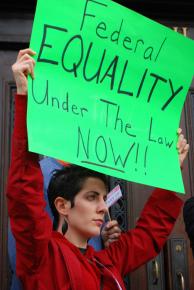DOMA overturned in Massachusetts
reports on a court decision against the federal ban on same-sex marriage.
A FEDERAL judge in Massachusetts, ruling in two related cases, declared the Defense of Marriage Act (DOMA) unconstitutional on July 8, a victory for supporters of marriage equality.
DOMA, passed by a Republican-controlled Congress and signed into law by Democratic President Bill Clinton, defined marriage as between one man and one woman and allowed states to not recognize same-sex marriages performed legally in other states.
The law denies over 1,100 federal benefits to same-sex couples married in states where gay marriage is legal. These include the right to file joint tax returns (often at a lower rate), share Social Security and food stamps, receive spousal employment benefits (such as health insurance) or sponsor an immigrant spouse for legal residency or citizenship.
In other words, DOMA relegates same-sex couples legally married in states such as Massachusetts to second-class status in the eyes of the federal government.
The first case, Gill v. Office of Personnel Management, was filed by a federal employee whose lawyers from Gay and Lesbian Advocates and Defenders argued that because the bill prevented her and her same-sex spouse from receiving federal employment benefits, DOMA denied her equal protection under the law--a violation of the Fifth Amendment of the Constitution.

The second case, Commonwealth v. Health and Human Services, was brought by the state of Massachusetts, which argued that DOMA interferes with a state's right to define marriage as it chooses by requiring it to discriminate against same-sex couples or lose millions of dollars of federal money yearly.
U.S. District Court Judge Joseph Tauro's rulings apply only to same-sex couples married in Massachusetts, and they only declare unconstitutional the part of DOMA that defines marriage as between one man and one woman, so states will still be able to ignore same-sex marriages performed in other states.
NOW, THE question is whether Barack Obama's Justice Department will appeal the Tauro's decision to a higher court in the federal system.
During the 2008 election campaign, Obama repeated again and again that he opposed DOMA. For example, his campaign Web site declared: "I...believe that the federal government should not stand in the way of states that want to decide on their own how best to pursue equality for gay and lesbian couples--whether that means a domestic partnership, a civil union, or a civil marriage."
Candidate Obama went so far as to cite his support for a repeal of DOMA as a reason to choose him over Hillary Clinton in the Democratic primaries: "Unlike Senator Clinton, I support the complete repeal of the Defense of Marriage Act (DOMA)--a position I have held since before arriving in the U.S. Senate...Federal law should not discriminate in any way against gay and lesbian couples, which is precisely what DOMA does."
Obama renewed this commitment as president when he spoke at the Human Rights Campaign dinner on the eve of the National Equality March in October 2009.
But despite this record, the Obama Justice Department is widely expected to appeal the decision in the Massachusetts' cases to the First U.S. Circuit Court of Appeals--and potentially to the U.S. Supreme Court.
The administration claims that it's up to Congress to repeal DOMA, and in the meanwhile, it has to "uphold existing law." The Gay City News explained the administration's tortured logic in defending a law its chief claims to oppose:
[T]he Obama Justice Department devised the bizarre claim that DOMA was an attempt by Congress to preserve the status quo "pending the resolution of a socially contentious debate taking place in the states over whether to sanction same-sex marriage." The government argued that DOMA was necessary "to ensure consistency in the distribution of federal marriage-based benefits," and to avoid the disruptions from having to deal with different definitions of marriage in different states.
If administration officials do appeal the rulings in Massachusetts, it wouldn't be the first time the Obama Justice Department defended DOMA in federal court. In June 2009--within days of Obama declaring LGBT Pride Month--Justice Department lawyers claimed that DOMA was constitutional and non-discriminatory, citing as precedents laws that barred marriage in cases of incest and pedophilia.
Some left-wing commentators think it would be a good thing for the Justice Department to appeal Tauro's decisions, because if the cases go to the Supreme Court and the Court rules against DOMA, it would strike a blow against the marriage ban at the national level, rather than just Massachusetts.
Jim Burroway, editor of Box Turtle Bulletin Web site, makes the case that a Supreme Court decision against DOMA following an appeal by the Justice Department is more likely to succeed than passage of a congressional repeal, such as the Respect for Marriage Act introduced in 2009 by Rep. Jerrold Nadler (D-N.Y.). "With the next Congress likely to be much more hostile to LGBT issues as this Congress," Burroway wrote, "I've got lottery tickets with better odds than Congress repealing DOMA."
But the struggle for marriage equality can't depend on hoping for justice from a federal court system stacked with conservative judges. Nor should we accept a lengthy appeals process that could take years before the Supreme Court rules on DOMA.
Instead, we should use the momentum we have built in the past two years, including the enthusiasm generated by this victory in Massachusetts, to demand full equality now. We should demand that the Obama administration live up to the promises of its president and stop defending DOMA in court, and we should call for Congress to get to work on the job of repealing DOMA once and for all.


